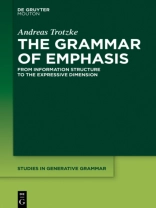This book reconsiders the linguistic notion of emphasis. For many, the concept of emphasis is confined to information structure. However, our understanding of the grammatical reflexes of emphasis is only partial as long as the expressive side of utterances is not taken into account. The book explores similarities, differences, and interactions between information structure and the expressive dimension of language in the domain of natural language grammar.
Specifically, this monograph demonstrates that specific word order options, sometimes in combination with discourse particles, yield meaning effects that are typical for the expressive side of utterances and endow them with an exclamative flavor. Approaching this issue from a syntactic point of view, the book shows that there are syntactic categories (e.g., a certain class of particle verbs) and word orders (e.g., certain fronting patterns involving discourse particles) that directly connect to expressive meaning components. The work presented in this monograph combines theoretical analysis with experimental evidence from both perception and production studies.
Über den Autor
Andreas Trotzke, Stanford University, USA












